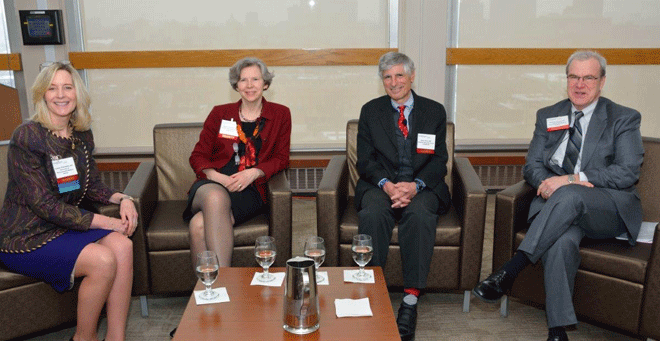 |
|
| Luanne E. Thorndyke, MD; Karen Antman, MD, of Boston University; Philip Pizzo, MD, of Stanford; and Terence R. Flotte, MD. |
Technological innovations in education, changes in clinical reimbursement, increased competition for research funding and different expectations for balance between work and outside life have greatly affected faculty work and satisfaction. The challenges facing academic medical centers in recruiting and retaining talented faculty throughout their career path require a portfolio of new strategies.
By designing programs targeted to critical phases in the career of academic medical school faculty, UMass Medical School’s Office of Faculty Affairs has become a national resource for programs that support some of the most important, and often most difficult, professional transitions.
Leading a collective of seven medical schools, the American Council on Education and the New England Network for Faculty Affairs, UMMS organized a recent conference in Boston, Career Flexibility for Biomedical Faculty of Today and Tomorrow, which brought together more than 100 medical school leaders from across the country and fulfilled a key goal of the 2012 UMMS grant from the Alfred P. Sloan Foundation to accelerate work on faculty career flexibility initiatives. Alongside the provost and dean of Boston University Medical School and the dean emeritus of Stanford University, Terence R. Flotte, MD, the Celia and Isaac Haidak Professor of Medical Education, executive deputy chancellor, provost and dean of the School of Medicine, participated in a blue ribbon panel discussion about assuring a vibrant faculty in the future.
“The issues discussed at this conference are of paramount importance as medical schools and their faculty face challenges in all missions,” said Dr. Flotte. “I’m proud that UMMS is at the leading edge of the work in this important area.”
A key component of the recent conference was the creation of learning networks that will continue work in specific areas after the conference has ended. The learning networks will ensure that best practices are made available as widely as possible. The potential impact of the conference and the ongoing learning networks is significant. Nationwide there are more than 155,000 full-time faculty in academic medicine, according to the Association of American Medical Colleges. These individuals are providing the highest quality care to patients at the nation’s academic medical centers, making scientific discoveries that improve the health of our nation, and training the next generation of physicians and scientists to address the nation’s most pressing health needs.
At UMMS, a variety of programs address the range of faculty needs across a career, from assisting young faculty balance work-family responsibilities, ensuring that new faculty find mentors, supporting career development and advancement, and helping senior faculty navigate the transition through retirement.
For example, UMMS invests in aspiring faculty through the innovative program Peers for Promotion, which provides peer mentoring for assistant professors moving to mid-career associate professors by helping them recognize and articulate their accomplishments in the missions and their value to the institution.
“The program provided me with a good nudge to look at the body of my accomplishments,” said Neng Yu, MD, associate professor of pathology at UMMS. “It’s so easy to get caught up in the day-to-day. Peers for Promotion allowed me the time and platform to undertake a valuable moment of self-evaluation. We matter, and our personal goals matter, too.”
Junior and mid-career faculty must frequently juggle family care responsibilities. At UMMS, up to four Faculty Scholar Awards are also granted through a competitive process each year, enabling faculty to continue meaningful academic work while meeting family commitments.
Nationally more than 20 percent of medical school faculty are over the age of 60, including faculty at UMMS, making programs such as UMMS’s Transition Through Retirement important both to individuals and institutions.
“Retirement is a major life passage, which can be accompanied by fear and stigma,” said Luanne E. Thorndyke, MD, vice provost for faculty affairs and professor of medicine at UMMS. “We are working to bring this topic into the daylight for the benefit of all involved.”
“The programs that are being sponsored by the UMMS office of faculty affairs are essential for our relatively young medical school with an outstanding, committed—but aging—faculty,” said Marianne E. Felice, MD, who has had a distinguished career as a clinician, researcher and administrator. She is a professor of pediatrics at UMMS and former physician-in-chief of the UMass Memorial Children’s Medical Center; she also served as interim CEO of UMass Memorial Health Care from 2001 to 2002.
Dr. Felice added that she “welcomes the spotlight on this often closeted aspect of one’s career because most of us in academic medicine love what we do and we want to end our careers with grace and dignity. Unfortunately, in many institutions, senior faculty members have no one with whom they can hold this conversation.”
The unique and comprehensive framework at UMMS also includes robust mentoring opportunities throughout the faculty life cycle, a leadership speaker’s series, clear guidelines for faculty wishing to work part-time, individual consultations as needed, and a new, highly competitive, Faculty Vitality Award for mid-and-senior level faculty seeking to rejuvenate their careers.
“We have found this holistic approach to faculty development to be both necessary and effective,” said Dr. Thorndyke. “We are fortunate to have the support of our leadership to provide robust faculty development for our faculty at all phases of their career. Such support is essential to attracting, developing and retaining the very best faculty, who are the heart and soul of academic medicine.”